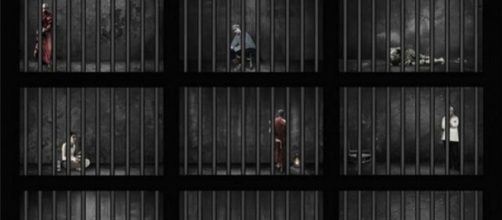As the plight of political prisoners in iran continues, for weeks there was no news about the whereabouts of Ali Moezi, the father of two Iranian opposition members. It has been learned he is held in Tehran’s notorious Evin Prison and allowed to have a family visit.
On January 4th Moezi was suddenly transferred from Gohardasht Prison, west of Tehran, to an unknown location without prior notice. He was scheduled to be released back in April 2015, only to be sentenced in absentia to another 12 months behind bars. With his sentence ending, Tehran is refusing to release him even based on its own rulings.
Iran and the many examples
Majid Assadi, a former political prisoner in Iran, has apparently been rearrested. Tahere Riyahi, a female journalist detained in Evin Prison, was provided with a very short telephone call with her family lasting less than a minute. There is new no information about her. Farzane Jalali, a women’s rights activist from Kermanshah in western Iran, was arrested on February 23rd and held at an intelligence detention centre.
The allegations raised against such political prisoners and prisoners of conscience lack any legal credibility and are arbitrary in nature. For example, Assadi has been accused of “assembly and collusion for measure against national security.” He was arrested for the same allegations back in July 2008 and sentenced to four years behind bars.
He was released in 2015 only to be rearrested. Riyahi was arrested on December 27th, 2016 for “propaganda against the state.” Farzane Jalali, another female political prisoner, was arrested in 2010 for following up on a case of small girls burned at a school fire incident.
Voicing concerns about Iran
The Iranian opposition National Council of Resistance of Iran (NCRI) has been actively seeking to save the lives of these political prisoners. Numerous parliaments across the globe and human rights organisations have hosted a variety of NCRI conferences to shed light on the Iranian regime’s atrocities.
Most recently, Asma Jahangir, the United Nations Special Rapporteur on the situation of human rights in Iran, released an important report expressing major concerns about no improvements witnessed in the country.
This is especially concerning considering the pledges made by Iranian President Hassan Rouhani and his signing of the Citizens’ Right Charter in December 2016.
Ms Jahangir has voiced specific concerns over juvenile executions, political prisoners being denied medical care, and the Iranian regime’s use of torture. The report specifically mentions the case of Mrs Maryam Akbari Monfared, “who was serving 15 years in prison in relation to her membership in the banned opposition group known as the People’s Mojahedin Organization of Iran (PMOI), [was denied] medical treatment… after she published a letter demanding justice for her brothers and sisters who were reportedly executed in 1988.”
This is a major development as a senior UN special rapporteur is acknowledging the summer 1988 massacre of over 30,000 political prisoners, mostly consisting of PMOI/MEK members and supporters.
This is a highly sensitive issue for the regime in Iran, especially following the revelation of a sound file associated to the late Ayatollah Hossein Ali Montazeri, the former successor of Iranian regime founder Ruhollah Khomeini. The sound file covers a meeting between Montazeri and members of the “Death Commission” tasked to carry out the 1988 massacres in Iran’s prisons.
The new UN report signals the need to take long overdue action against the mullahs ruling Iran. Those responsible for atrocities ongoing for the past 38 years, and especially targeting the country’s political prisoners, deserve to be placed before justice.

